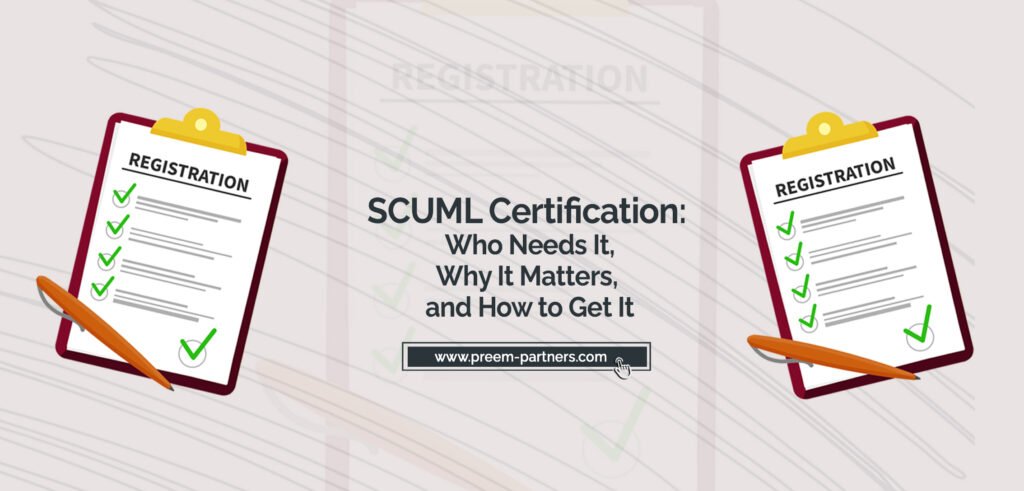
Preem & Partners | 16th May, 2025
In today’s rapidly-evolving Nigerian business landscape, regulatory compliance is no longer just a legal formality but also a critical part of building and running a secure and sustainable enterprise. If your business deals with client money, manages assets, handles large cash transactions, or is involved in large cash-based transactions, chances are you’ve heard about “SCUML”, perhaps from your bank, your accountant, your legal advisor, or even another entrepreneur.
But despite how often it’s mentioned, many entrepreneurs and professionals still ask: What exactly is SCUML? Why do I need it? What do I need to get it? And what could happen if I don’t have it? These questions will be answered in this article.
SCUML is an acronym for Special Control Unit Against Money Laundering. It is a unit under the Economic and Financial Crimes Commission [EFCC], established in line with Section 17(1) of the Money Laundering (Prevention and Prohibition) Act, 2022.
SCUML is responsible for monitoring, supervising, and regulating Designated Non-Financial Businesses and Professions [DNFBPs] to ensure they are not used as tools for money laundering or terrorism financing. In a bid to prevent and monitor money laundering and other illicit financial activities and as part of Nigeria’s anti-money laundering and counter-terrorism financing framework, the EFCC mandates that DNFBPs register with the unit and obtain a SCUML Certificate.
A SCUML Certificate is an official document issued to businesses that fall under DNFBPs. It shows that the business has been registered and verified by the EFCC for anti-money laundering compliance. Think of it like a security check -ensuring your business is not being unknowingly used for criminal activity.
The requirement for SCUML registration and obtaining a SCUML Certificate is backed by various laws and regulations, including Money Laundering (Prevention and Prohibition) Act, 2022, Terrorism (Prevention and Prohibition) Act, 2022, EFCC Act, 2004, FATF (Financial Action Task Force) Recommendations on anti-money laundering (AML) and combating the financing of terrorism (CFT).
Here are some of the major reasons why SCUML registration and certification matter.
1. Regulatory Compliance
SCUML registration is a statutory obligation, not a voluntary initiative. It is backed by the Money Laundering (Prevention and Prohibition) Act, 2022 and enforced by the EFCC. A business that falls under the DNFBP category and fails to register with SCUML risks falling foul of the law. This could lead to fines, compliance audits, sanctions, or even criminal investigations for money laundering offences.
Non-compliance doesn’t only attract penalties, it can lead to reputational damage, loss of licenses, or inability to bid for contracts, especially those involving government or large corporations. Obtaining a SCUML Certificate protects a business by showing that such business is playing by the rules and cooperating with national and global anti-money laundering efforts.
2. Bank Account Operations
One of the most immediate and consequential reason to obtain a SCUML Certificate is to keep your business bank account operational. As directed by the Central Bank of Nigeria [CBN], banks are under obligation to monitor the compliance of customers, particularly DNFBPs, and enforce a Post No Debit (PND) order on a DNFBP account that fails to provide a valid SCUML Certificate. Once this restriction is placed, the business will be unable to perform even the most basic transactions such as withdrawals, transfers, or direct debits.
For businesses, this means that suppliers won’t be paid, employees may not receive salaries on time, and clients could lose confidence in their services. The risk of operational shutdown is real. Banks do not hesitate to freeze accounts pending SCUML compliance.
3. Reputation and Trust
In the business world, perception is powerful. Businesses that demonstrate compliance with anti-money laundering and counter-financing of terrorism (AML/CFT) regulations are more likely to attract and retain serious clients, investors, and partners. On the other hand, a business that is unregistered with SCUML with evidence of SCUML Certificate may appear suspicious or illegitimate, even if it is innocent.
Having a SCUML Certificate would generally increase transparency, improve corporate governance, and assure stakeholders that your operations are above board. In certain industries and for certain stakeholders, SCUML certificate may act as a badge of credibility.
4. Global Transactions and Expansion
If a business aspires to transact internationally, attract foreign investors, or participate in cross-border partnerships, SCUML compliance becomes even more critical. International businesses, financial institutions, and development agencies increasingly demand proof that a business operates within a compliant legal environment.
SCUML certification aligns a business’ operations with global anti-money laundering (AML) and counter-terrorism financing (CFT) standards as recommended by the Financial Action Task Force (FATF). Without such compliance, international banks or partners may decline to do business due to reputational or legal risk.
This is mostly non-judicial and can take place either by the mutual consent or unilateral act of either of the spouse. The return of the bride price largely signals the dissolution of the marriage. Often, the reasons for divorce which are very common is mostly on moral grounds such as adultery, murder, etc.
SCUML certification is mandatory for all DNFBPs operating in Nigeria. These include:
Although the EFCC provides a defined list of Designated Non-Financial Businesses and Professions (DNFBPs) required to register with SCUML, practical experience has shown that other businesses not explicitly listed may also fall within the scope of this requirement. This typically applies where a business is perceived to engage in large cash transactions, trade in high-value goods, or serve as a middleman or facilitator in managing clients’ assets. In such cases, banks or regulators may demand SCUML compliance as a condition for account operation or continued business activity. However, it is important to note that software and technology startups are among the many businesses not monitored by SCUML and are not required to obtain a SCUML Certificate.
We have divided the process of obtaining a SCUML Certificate into three main steps: preparation of documents, application, and approval. Each of these steps involves several sub-steps.
Step 1:
The first step is to prepare all required documents. The checklist for registration is provided below.
A. Organisation’s Information:
a) Incorporated Name of Organisation,
b) Incorporation/Registration Number of Organisation,
c) Organisation’s Incorporation date,
d) Tax Identification Number [TIN] Print Out and TIN of Organisation,
e) Sector and Main Objective of the Organisation,
f) Full Physical Address of Organisation – including building name/house/block number, City/Community, Local Government Area, State,
g) All Organisation’s Incorporation/Registration documents [PDF or scanned copy],
h) Bank Details of the Organisation [Account Number, Account Name, Bank Name]
B. Information of Every Director or Trustee:
a) Full Name [Surname, First Name, Middle/Other Name]
b) Physical address [including building/house/block number, City/Community, Local Government Area, State
c) Phone Number
d) Email Address
e) Gender
f) Date of Birth
g) Scanned Means of identification with identification number in it or sent separately [preferably NIN/NIMC]
h) Bank Verification Number [BVN]
C. Information of Every Shareholder or Partner [if a Company, LLP, LP or Business Name]:
a) Full Name [Surname, First Name, Middle/Other Name]
b) Physical address [including building/house/block number, City/Community, Local Government Area, State
c) Phone Number
d) Email Address
e) Gender
f) Date of Birth
g) Scanned Means of identification with identification number in it or sent separately [preferably NIN/NIMC]
h) Bank Verification Number [BVN]
i) Ownership stake
D. Selected Additional Information/ Documents:
a) If a professional business like Law Firm, Accounting Firm, Audit Firm, Tax Firm, etc, certificate of Proficiency of each Director or Partner.
b) If it is a Church, Letter of consent/authority from the General Overseer of the Church [if it is a church]. Signature of the General Overseer is needed in this regard.
c) If it is Trust NGO, the following will be the additional information documents needed:
Step 2:
The next step after preparing all the required documents is to apply for registration. The registration process is entirely online and must be completed through SCUML’s official portal.
The application begins with creating an account, followed by completing the necessary forms, uploading all required documents in the correct format and order, and then submitting the application for processing.
Step 3:
After application, the applicant has to wait for verification and approval. SCUML will conduct preliminary due diligence on the organisation and verify or reject the application. When verified, the application is either rejected or approved. Once approved, the certificate will be issued.
From enabling your bank to remove restrictions from your account, to keeping you compliant with anti-money laundering regulations, SCUML registration is a necessary part of running a transparent, trusted, and law-abiding business. For businesses operating in Nigeria that fall under the categories of Designated Non-Financial Businesses and Professions, obtaining a SCUML Certificate is a legal requirement that can directly affect the business’ ability to run efficiently.
Lookups
Sections 17 – 22 of the Money Laundering (Prevention and Prohibition) Act, 2022.
